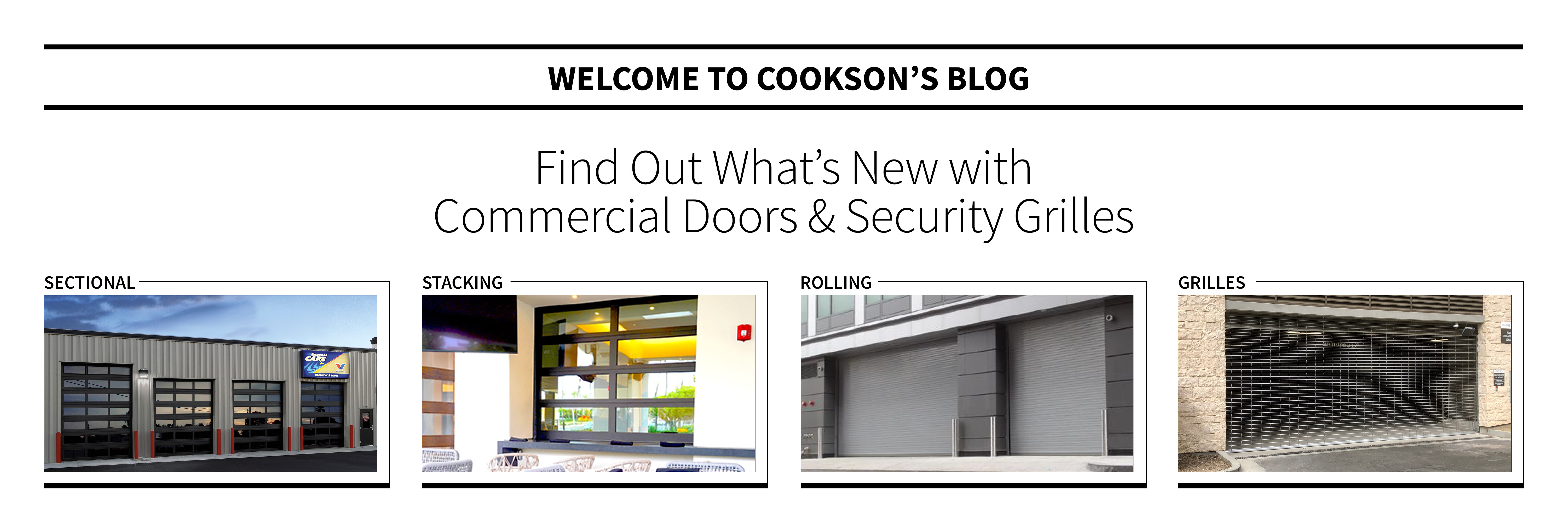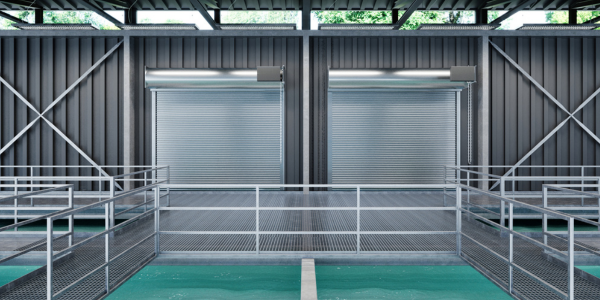

Cookson Blog
Welcome to the Cookson Blog! - Roll Up Door and Security Grille news - What's New?
SUBSCRIBE
Get updates on new blog posts to your inbox!
Industries That Would Benefit from Corrosion-Resistant Rolling Doors
Instantly step up facility security, lower operational costs, and boost efficiency with these specialized doors.

Most rolling doors are pretty durable, but for facilities exposed to harsh weather or corrosive chemicals, a standard model just won't cut it. Chemical plants, water treatment facilities, coastal sites, and buildings exposed to constant moisture—like car washes or agricultural storage facilities—are some of the harshest conditions for any commercial rolling door system. Corrosion-resistant doors are designed with heavy-duty metals, finishes, and coatings that ensure dependability in the most challenging environments.
Nicole Vivalda, senior product manager at Clopay Corp., says, “Corrosion is a natural process that occurs when a metal surface oxidizes, and if not correctly prevented in commercial facilities, it can impair safety operations and affect bottom-line costs."
On a standard rolling door in a harsh environment, corrosion can quickly erode the metal curtain and damage its components. This will lead to material and equipment damage in the facility and door operation failure. "Corrosion-resistant rolling doors offer a solution to the growing need for modernizing facilities in a variety of industries where corrosion can threaten vital resources,” says Nicole.
Below, you'll learn everything you need to know about corrosion-resistant rolling doors and see why they're worth the investment.
What are corrosion-resistant rolling doors?
Corrosion refers to the degradation and weakening of metal caused by a reaction to its surrounding conditions. Corrosion-resistant rolling doors are a go-to option for industrial environments to avoid expensive repairs and replacements. These doors feature the following fundamental characteristics:
- Materials: A corrosion-resistant door must be made from materials that can withstand high levels of exposure, such as stainless steel, galvanized steel, and aluminum.
- Finishes and coatings: In addition to the materials used, corrosion-resistant doors must have finishes that provide another layer of defense against external corrosive factors. Omni Powder Coat finish is offered in various colors to create a protective barrier that also looks great.
- Design: Every element of a rolling door must withstand corrosion, from the fasteners to the bearings to the headplate. These components must be made from suitable materials and have the right coatings for longevity.
Benefits of corrosion-resistant rolling doors.
Explore the primary benefits of installing corrosion-resistant rolling doors from Cookson in your industrial facility:
- Durability: Corrosive environments can cause materials that are not suited for such conditions to degrade, leading to structural integrity issues. The right materials will ensure your rolling doors are up for the challenge and can endure the elements.
- Less maintenance: Another key advantage of corrosion-resistant doors is cutting down on maintenance needs and their associated costs. Since these doors are made for harsh environments, you'll deal with fewer repairs while offering greater protection for your equipment.
- Appearance: You can combat red rust and oxidation from harsh and eroding elements by selecting doors made from corrosion-resistant materials. This allows you to keep your space looking clean and professional.
- Safety: In extremely harsh industrial environments, corrosive elements can impact the door's integrity, thus impacting your space's overall safety and security.
Explore 10 industries that can benefit from corrosion-resistant rolling doors.
Businesses in various industries can benefit from installing corrosion-resistant rolling doors. Explore some of the top sectors below:
1. Food processing
The food processing industry can rely on corrosion-resistant doors to maintain hygienic standards and combat contamination in factories. These rolling doors are able to withstand harsh cleaning agents used to ensure the facility meets strict food production safety standards and regulations.
2. Pharmaceutical
Maintaining a sterile environment is crucial for pharmaceutical settings. These facilities can use corrosion-resistant rolling doors to protect the integrity of their sensitive products and processes.
3. Chemical storage and processing
Chemical storage and processing plants must use corrosive-resistant materials. Standard doors can quickly degrade and break down when exposed to these environments. The right rolling doors can create a much-needed barrier and combat chemical exposure.
4. Wastewater treatment
Wastewater treatment is another common industry that can utilize corrosive-resistant rolling doors to its advantage. These plants require doors that can combat corrosion and deterioration, ensuring they always have reliable, secure access to essential treatment facilities.
5. Automotive
Automotive businesses can benefit from installing noncorrosive rolling doors, especially in areas where vehicles are cleaned or serviced. The doors' materials must be able to withstand the water, cleaning agents, and chemicals in these facilities. These doors can also provide protection and a much-needed barrier, helping to keep the vehicles and their parts secure.
6. Oil and gas
The oil and gas industry deals with many extremely corrosive elements and environments. They must have doors in their industrial facilities that can withstand harsh conditions to adequately protect indoor equipment and structures.
7. Power generation
A combination of chemical exposure and high temperatures is a recipe for corrosion, which is a serious and expensive issue for many power plants. These facilities can benefit from installing corrosion-resistant rolling doors that are more durable and won't need frequent replacement.
8. Pulp and paper
Pulp and paper manufacturers deal with harsh chemicals, alkaline solutions, moisture, and molten salts, all of which can accelerate corrosion. Every nook and cranny of the doors used in these facilities needs to be protected from corrosion.
9. Coastal and marine
The marine industry is no stranger to corrosion. Saltwater degrades the doors on ships, water structures, and offshore platforms. Continuous exposure to the water is a serious challenge for businesses and nonprofits in this sector.
10. Manufacturing
The manufacturing industry can also reap many benefits from installing corrosion-resistant rolling doors at its facilities. These doors need to be highly secure and also able to withstand strong cleaning agents and harsh materials used in production.
Review these key factors when choosing corrosive-resistant rolling doors.
Before choosing new doors for your facility, explore the following considerations:
- Corrosive elements present: What specific corrosive materials or chemicals does your facility work with? These elements will help you determine which rolling doors offer adequate resistance and are right for your space.
- Materials and finishes: Rolling doors and their components must be made from corrosion-resistant materials to support resilience. Ensure that every component features a finish or coating that will combat degradation.
- Operational requirements: Don't forget to consider functionality and operation. Your doors play an important role in keeping your space clean, safe, and secure. Ensure you choose rolling options that can protect your facility and support your daily processes.
- Compliance: Many of the industries outlined above have strict standards for maintaining things like hygiene and indoor fire safety. The rolling doors from Cookson meet various current codes and regulations. Our team will help you ensure you choose a model that meets your business's unique needs.
Ready to upgrade to corrosion-resistant rolling doors? Contact us to get started.





